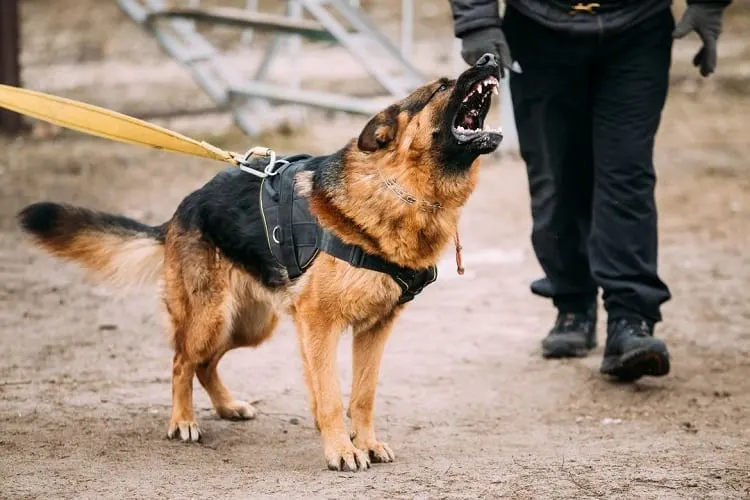How to Stop Your German Shepherd From Barking
German Shepherds can be barky dogs. In fact, they’re known to bark an awful lot!
Of course, it’s unreasonable to expect any dog always to be quiet. They are animals, not machines, and must be given room to express themselves healthily.
If, however, the barking is getting out of hand, we’ll give you some things that you can do to curb the behavior productively.
Why Do German Shepherds Bark?

Let’s start by diving deeper into why dogs, especially the German Shepherd breed, bark at all. Barking is an important part of dog communication and is often done to communicate something that’s disturbing a dog.
While some happy barking is always a “thing”, dogs tend to communicate their more positive emotions through body language and their tails, so barking is worth paying attention to. Here are some common reasons for vocalizing in German Shepherds.
Protecting Territory
As a territorial breed, German Shepherds will protect the people and territory they see as “theirs”. A disturbed GSD will bark at intruders or perceived threats to their people, every time.
With this barking, you will see aggressive body language —think raised heckles and a stiff, straight spine and tail. It’s important to respond (appropriately) to this type of warning bark, as it’s often the precursor to a more violent defense, whether appropriate or not.
This is also a good example of why you shouldn’t constantly shush your dog when it barks. Barking and growling both serve as warnings of more severe retaliation, and you never want to create a dog who doesn’t warn you of what is happening in their head, especially if that is aggression or fear.
Shaky Manners
If you haven’t properly trained and socialized your dog on how to meet new friends, humans, or dogs, you may face over-excitement barking instead of the positive, friendly, and humble behavior you wish.
Scared

Likewise, a warning bark or two often indicates that the dog has been startled. Typically, it will be a single, very loud bark, or a couple of barks in sequence.
Some dogs may subvocalize, or “huff”, instead of barking properly, especially at the very first sign of something unusual.
The dog may stand and turn to the source of the disturbance, or stand and prick its ears to listen for further danger. They’re getting ready for possible action, but not launching into it.
Anxiety
Separation anxiety barking can become a huge issue. It’s a sign that the dog is unhappy and anxious, and it is annoying for the people around you.
Running in circles, being destructive, pacing, and other compulsive behavior often accompany this barking.
Separation anxiety is a complex issue, and may need a more thorough response than we cover here—but our tips will help get you started.
Attention Seeking
Barking is a communication type among dogs, so they will use it to get what they want. As an intelligent, many German Shepherds will bark to tell you they want something, be it a pet, a toy, or something you’re busy with.
They might bark to go outside to potty, or bark to get a cuddle. It’s often harmless but can become too much if used maladaptively, and it may sometimes be necessary to revisit training.
Positive Barks
Barking can herald good things, too. As with attention seeking, it’s not always bad, and some playful barking should be allowed. Only seek to curtail this one if it has become obsessive or maladaptive.
A happy bark is usually accompanied by a play bow, a wiggly tail, and other positive signs. It’s common for dogs to bark when their people come home, the toys or leashes come out, and other good things happen.
Ways to Stop a German Shepherd From Barking

So now you know more about the common causes of a German Shepherd’s barking, what can you do about it? Let’s take a look.
Avoid Aggressive Behaviors Near Your Dog
As responsible dog owners, it’s important always to take ownership of your behavior. Remember that even smart breeds like the GSD operate at about the emotional level of a 2–4-year-old child, and they can’t read your mind.
Even if you are only “playing” with another family member, or simply yelling to blow off steam, you can upset your dog, resulting in their bad behavior. They don’t understand that the threat isn’t real.
Fighting and yelling between family members can trigger anxiety or aggression in a protective breed like this. Likewise, aggressive “play” with your dog doesn’t always communicate itself to them as play.
And actions like shaking the gate, yelling, wearing a hoodie, or obscuring clothes that they haven’t seen you in before, and other actions can stimulate them into aggression without you meaning to.
Remove Triggers

Sometimes, the simplest solution is best. If your dog barks at things they can see, remove their ability to see them.
This could be privacy screening or closed fencing, removing the dog from the hallway or front door area, or as simple as removing an offending holiday decoration. Make your life, and theirs, easier.
Teach Your Dog to Bark on Command
You can teach your German Shepherd to speak and be quiet on command. This will help them understand a situation better. Reward the dog when you want them to bark.
Get them excited with play or a toy. Then, reward them with the “speak” command, shush them, and reward them for the “quiet” command. A smart breed like this will pick it up quickly.
As they get more confident, start rewarding for one bark only, and start making the “quiet” time longer and longer.
Over time, you will develop the “quiet” command to hush them as needed, and still have the “speak” command to help you when you need it, too.
Desensitization to Objects That Scare Them
Sometimes called counter-conditioning, this is used for dogs that have developed compulsive behaviors around objects or situations.
Say, for example, your dog thinks the mailman is scary. You counter-condition the dog by bringing something positive—like a treat or a toy—into the situation where they encounter the “scary” thing.
Don’t press the dog too hard or loom over them. Simply stand quietly and calmly approach your dog with the “positive” object. There also needs to be a high-value reward, so it is “more interesting” than the scary object.
As they get used to the positive side of an interaction, you can move them closer and closer to the “scary” thing, still using the same calm positivity. This is a kind and humane way to train out bad behavior.
Remember to keep the treat bag on hand for these training methods, as it’s no use having to look around to find it when you need it!
For example, If your dog commonly barks at the door, leave some treats in a safe space near the door, so you’re always ready for positive reinforcement of good behavior.
Things Not to Do When Your German Shepherd Is Barking

Unfortunately, well-meaning owners often make barking problems worse, not better, with their own behavior. Here are some things you should never do to stop a German Shepherd from barking.
Punishment
Yelling, hitting, kicking, and overacting toward your dog is not the way to go. Not only does this enforce their sense of fear (and possibly aggression), but it does nothing productive.
They learn to be afraid of you and see you spin out of control in the presence of the thing already making them nervous, obviously reinforcing it as a problem. They also take the “any attention is positive attention” route and will assume you want them to continue.
Anti-barking Collar

Remember what we said above? You want to get your dog’s barking under control, but it’s a bad idea to train them out of all their warning signs in the first place.
Plus, these collars use pain and negative reinforcement; no good pet owner should allow that. The dog will learn nothing except that extra pain and scariness come with the already fearful or stressed action.
Just because these collars might get them to shut up, it doesn’t mean that you’ve created a happy, healthy dog with a better understanding—you’re just making a cowed, bullied animal, with even less security and control.
Somewhat related, this isn’t the right way to use a muzzle, either. Not only should a properly fitted muzzle not block your dog’s ability to bark, but it also becomes a punishment instead of a tool, and they don’t learn good behavior from experience.
Conclusion
While excessive barking can be annoying, there is a lot that you can do as a good pet owner to prevent and retrain for a better outcome. Remember, barking is communication, so it all starts with understanding what your dog is telling you.
Understanding why your dog barks, then using positive training to help control it, will soon lead to positive results. Remember, with German Shepherds, calm responses and plenty of praise for good behavior are the way to go.






























